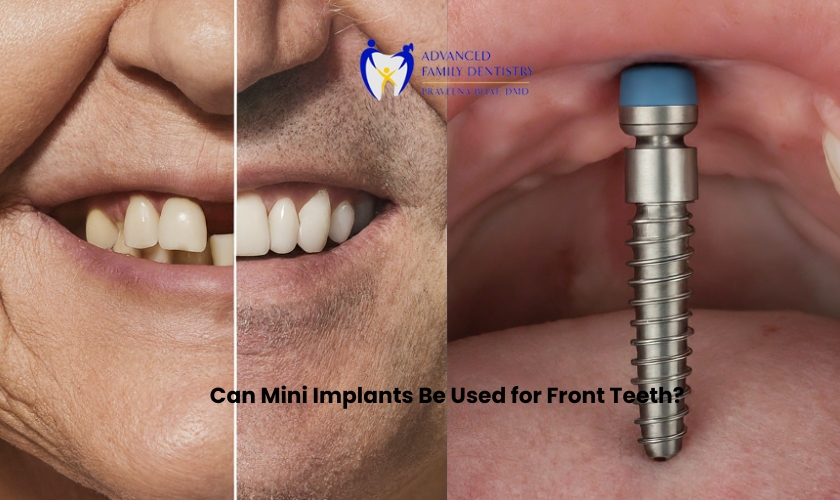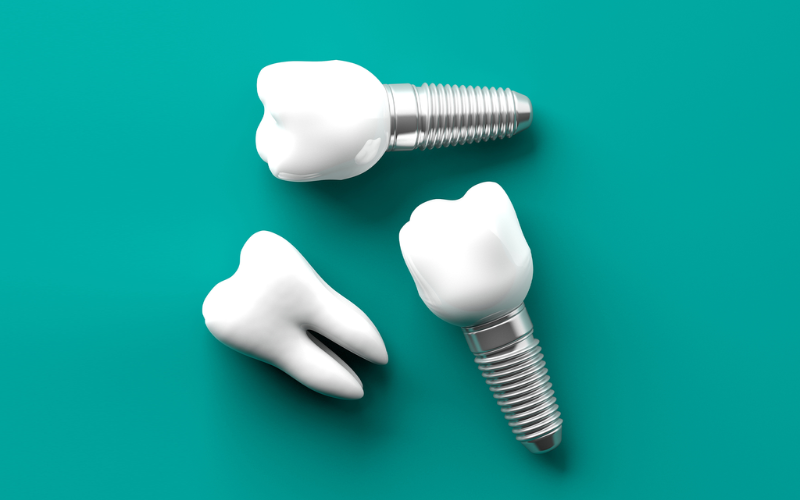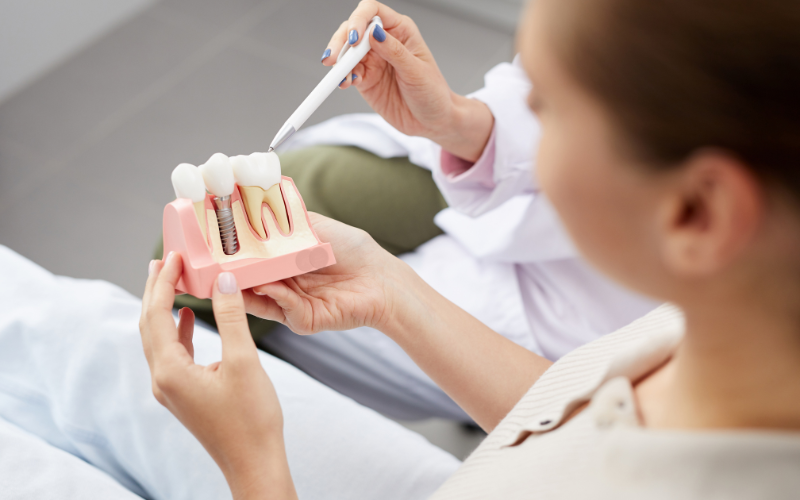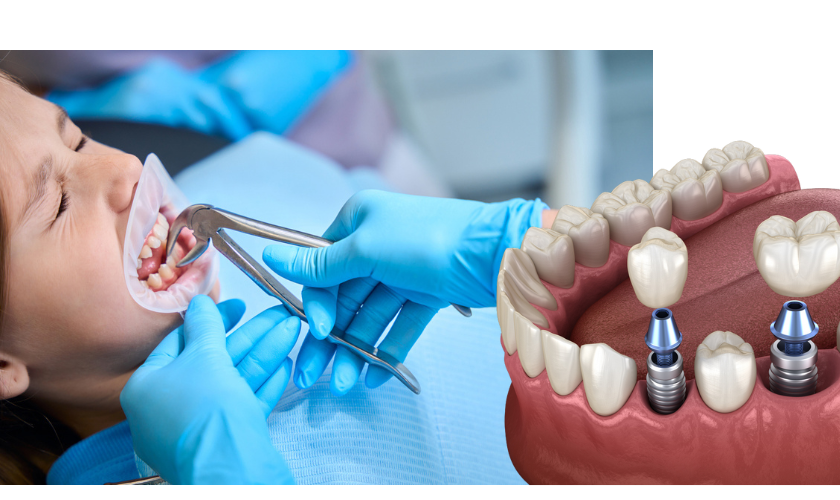Top Family, Cosmetic and Implant Center In 537 Amherst St, Nashua, NH 03063
Can Mini Implants Be Used for Front Teeth?

Tooth loss, especially in the front of the mouth, can significantly impact your confidence and smile. Traditional dental implants offer a permanent solution, but the procedure can be lengthy and require sufficient jawbone density. This is where mini dental implants come in – a potentially quicker and less invasive option for replacing missing teeth. But can mini implants be used for front teeth? Let’s delve into the world of mini implants and explore their suitability for restoring your dazzling smile.
Unveiling the World of Mini Dental Implants
Mini dental implants are smaller versions of traditional implants, designed for specific situations. They boast a narrower diameter (around 2-3 millimeters) compared to traditional implants (3.25-5 millimeters) and require less jawbone for placement. This makes them a potential solution for patients with limited bone density or those seeking a quicker implant procedure.
Can Mini Implants Be Used for Front Teeth?
The answer is yes, mini implants can be a viable option for replacing missing front teeth under certain conditions. Front teeth, particularly the incisors and sometimes the lateral incisors, are typically smaller and experience less biting force compared to back molars. This makes them suitable candidates for the smaller support structure offered by mini implants.
Here’s why mini implants might be a good fit for your missing front tooth:
- Less Invasive Procedure: Mini implant placement is a less invasive surgery compared to traditional implants. This translates to quicker healing times and potentially less discomfort for the patient.
- Quicker Treatment: The smaller size of mini implants allows for a potentially one-step procedure, eliminating the need for multiple appointments.
- Bone Density Considerations: For patients with limited jawbone density, especially in the front of the jaw where bone is typically thinner, mini implants might be a suitable alternative to traditional implants that require more bone for secure placement.
- Cost-Effectiveness: Mini implants are generally less expensive than traditional implants due to the simpler procedure and smaller materials used.
Exploring the Downside of Mini Dental Implants
While mini implants offer several benefits, it’s crucial to consider their limitations before making a decision:
- Limited Durability: Mini implants are generally considered less durable than traditional implants due to their smaller size and reduced surface area for osseointegration (fusion with the jawbone).
- Force Limitations: Due to their smaller size, mini implants might not be suitable for replacing back teeth that experience significant biting forces.
- Aesthetics: Mini implants are typically used with smaller crowns to match their diameter. This might be less noticeable for front teeth, but for larger back teeth, the smaller crown size could appear less natural.
- Not Always a Permanent Solution: While mini implants can be long-lasting, they might have a higher risk of failure compared to traditional implants due to the aforementioned limitations.
Can Mini Dental Implants Be Used for Upper Teeth?
Yes, mini dental implants can be used for upper teeth, including the front teeth, provided that the conditions are suitable. The upper jaw, particularly the front region, often presents a unique set of challenges due to its bone density and anatomical structure. However, mini implants can be a viable option if there is enough bone density to support the implant.
Can an Implant Be Done on a Front Tooth?
Implanting a front tooth is one of the most challenging yet rewarding procedures in dentistry. The aesthetic and functional demands are high, requiring precision and expertise. Fortunately, dental implants, including mini implants, can be successfully used to replace front teeth.
The process typically involves several steps:
- Initial Consultation and Planning: This includes a comprehensive dental examination, imaging studies (like X-rays or CT scans), and a detailed discussion about the patient’s expectations and requirements.
- Bone Assessment: Adequate bone volume is crucial for implant stability. If there is insufficient bone, procedures like bone grafting may be necessary.
- Implant Placement: The implant is surgically placed into the jawbone. For mini implants, this procedure is less invasive and can often be completed in a single visit.
- Healing Period: The implant needs time to osseointegrate (fuse with the bone). This period can vary but is generally shorter for mini implants.
- Abutment and Crown Placement: Once the implant is securely integrated, an abutment is attached, and a custom-made crown is placed, restoring the appearance and function of the front tooth.
Using mini implants for front teeth can be particularly advantageous for patients with limited bone density or those seeking a quicker, less invasive solution. However, the aesthetic demands mean that precision and a high level of expertise are essential.
How Much Do Mini Dental Implants Cost Compared to Regular Implants?
Cost is a significant factor for many patients when considering dental implants. Mini dental implants are generally more affordable than traditional implants. The lower cost is due to several factors, including the smaller size of the implants, the less invasive procedure, and the reduced need for additional surgeries like bone grafts.
On average, a single mini implant can cost between $500 and $1,500, whereas a traditional implant can range from $1,000 to $4,000 per implant. These costs can vary based on geographical location, the dentist’s expertise, and the specific needs of the patient.
While mini implants have a lower initial cost, it’s important to consider the long-term expenses. Mini implants may require more frequent maintenance or replacement, which can add to the overall cost over time. However, for many patients, the immediate affordability and the less invasive nature of mini implants make them an attractive option.
Conclusion
Mini dental implants offer a promising alternative to traditional implants, especially for front teeth. Their less invasive nature, cost-effectiveness, and suitability for patients with lower bone density make them an attractive option. However, like any medical procedure, they come with their own set of advantages and limitations.
If you’re in Nashua and searching for “Mini Dental implants near me” for your front teeth, then look no further to Advanced Family Dentistry Nashua. it’s essential to consult with a trustworthy high professional Nashua dentist to evaluate your specific needs and circumstances. With the right care and professional guidance, mini dental implants in Nashua can restore your smile and confidence, providing a functional and aesthetically pleasing solution to tooth loss.




